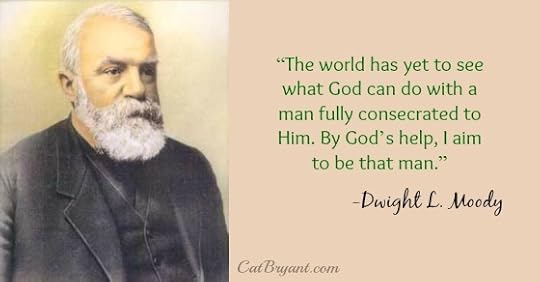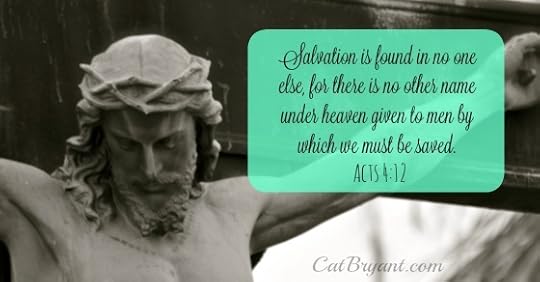Cathy Bryant's Blog: CatBryant.com ~ Journey Blog, page 14
November 20, 2015
Walk Through the WORD Acts 11-12

Walk Through the WORD – Previous Posts
Acts 1-3
Acts 4-6
Acts 7-8
Acts 9-10
Today we walk through the WORD Acts 11-12. Join us as we walk together through the Word of God–to better know Him and make Him known, to gain strength for the journey as we grow in our faith, and to join our hearts in unity as the body of Christ.
In yesterday’s study, we looked on in awe as Jesus turned a persecutor into a devoted follower and sent His Spirit to Gentile believers, much to the amazement of the apostles and other Jewish believers. Today we’ll walk through God’s continued work among the early church.
Walk Through the WORD Acts 11-12
Read: Acts 11:1-30
Key Points:
{vss. 1-3} Word spread quickly that even Gentiles were accepting the good news about Jesus. So you would think the Jewish believers and apostles would be excited. But when Peter went back to Jerusalem, he was criticized and condemned for entering the house of Gentiles and eating with them. The lesson here for us is to be careful and prayerful of criticizing others, especially fellow-believers. Often criticism only carries with it a dividing of powers. As Jesus stated: “A house divided against itself cannot stand.” (Matthew 12:25; Mark 3:25; see also Galatians 5:15) Those who criticized Moses as he led the people through the wilderness often did so with disastrous results, including Moses’ sister Miriam, who was struck with leprosy (Numbers 12:9-10).
{vss. 4-18} If the first three verses teach us to exercise caution when criticizing others, Peter’s answer reveals how we should respond when criticized. Our first reaction is usually hurt and anger, but we don’t see that from Peter. Instead, he tells his account of what happened, ending with the comment that he didn’t want to oppose God and His work in the lives of these new believers. His answer satisfied the others, and they praised God for the work He had done among their new brothers and sisters.
{vss. 19-21} Those believers who scattered at Stephen’s death went as far as Phoenicia, Cyprus, and Antioch, but only told the Gospel to Jews. But then men from Cyprus and Cyrene carried the message to the Greeks of Antioch. This was very important, because Antioch was the capital city of the Roman province of Syria the third largest city in the Roman Empire, and center of commerce. It soon replaced Jerusalem as the top city for Christianity and became the center of early missionary activity (Acts 13:1; Acts 14:26; Acts 15:35; Acts 18:22). The Lord’s hand was in all of this, and many turned to God and believed, proving once more that without the touch of God, our work is in vain.
{vss. 22-24} Once again, the news of God’s working in these areas reached the Jerusalem church, so they sent Barnabas to Antioch. Acts 4:36-37 tells us that Barnabas, whose name means “Son of Encouragement,” sold a field and gave the money to the apostles. He plays a vital role in the early missionary activity of the church (Acts 9:27; Acts 11:22-24; Acts 13:2; Acts 15:12-25). From our current passage, we learn that he lived up to his name by encouraging the new Antioch believers to stay true to the Lord with all their hearts. The passage also reveals that he was a good man, full of the Holy Spirit and faith. Because of his work through God’s Spirit, a great number were brought to faith in God.

{vss. 25-26} Continuing to encourage the faith and ministry of others, Barnabas brings Saul to Antioch, where for a whole year the two men discipled the new believers. In this passage we learn that these believers were first called Christians in Antioch. This name was given by Gentiles to distinguish between them and the Jews. The term only appears here and in 1 Peter 4:16.
{vss. 27-30} Though the detail given about the prophet Agabus and his prophecy about a famine which occurred during the reign of Claudius (AD 46) might seem minor, in all actuality, it is very important. Why? Because it lends historical accuracy to the Bible and yet another way to convince others that its words are true. Verse 29 shows that these disciples used whatever abilities they had to provide help for believers in Judea. Remember that the Judean believers lived under the threat of constant persecution at the hands of the Jews and were often disowned by their families and excommunicated by the synagogues. This had a trickle-down effect of denying them even a means of employment, food, and housing. The Antioch believers sent their gifts to the elders in Jerusalem via Barnabas and Saul. (See 1 Timothy 3:1-7 and Titus 1:5-9 for qualifications for elders.)
Read: Acts 12:1-25.
Key Points:
{vss. 1-5} Herod Agrippa I, the grandson of Herod the Great who ruled during the time of Jesus’ birth, at least from all outward appearances, was a religious man and practitioner of the Jewish faith. Because of this association with Judaism, he became a persecutor of Christians. He arrested many and killed the first apostle to be martyred, James the brother of John. His Jewish friends were of course very pleased with this, so Herod arrested Peter as well. The defining moment comes in verse 5, when the church earnestly prayed for Peter. No matter how grim the circumstances, there is power in prayer. Not only should we join with others in prayer, but we should do so persistently.
{vss. 6-11} It’s always darkest before the dawn, and Peter’s situation bears witness to this fact. The night before his trial (which most likely would have been a mockery of justice as in the trial of Jesus), Peter slept between two guards, bound with chains, and sentries on duty near the door. The fact that Peter slept reveals either profound fatigue or complete trust. In John 21:18, Jesus had revealed the brash fisherman would live to old age, so perhaps those words sustained him. The angel of the Lord came, released Peter’s chains, and led him out of the prison. Only after the angel left did Peter realize that he’d been divinely delivered. Surely the situation with both James and Peter causes us to question God’s inscrutable ways. For whatever reason, Peter escaped with his life while James was executed. But we should remember that both were safe in Him. Whether in life or death, we are the Lord’s (Philippians 1:21).
{vss. 12-19} Peter made his way to the house of Mary, the mother of John Mark (not the apostle John), where many had gathered to pray. I find it very human of the group of praying friends to have persistently prayed for Paul, but without the faith that God would deliver. This is made evident by the fact that they thought Rhoda had seen Peter’s angel, indicating that they assumed he had already been executed. But Peter kept knocking until they let him in. He relayed the story of his release and asked them to tell James (not James the brother of John, but James the brother of Jesus, who became the pastor of the Jerusalem church). Can you imagine the commotion at the unexplained disappearance of Peter? Though Herod searched for him, he couldn’t be found. Instead of killing Peter, he executed the guards who had let him escape.
{vss. 20-25} No man can set himself up against God and expect to go unscathed, as Herod would soon find out. On a visit to Caesarea, he was praised by the people as being a god rather than man. Instead of passing the praise on to the One True God, he evidently reveled in their praise. God struck him down, and he was eaten by worms. In contrast to the untimely end of Herod Agrippa, God’s Word continued to spread and multiply. When Barnabas and Saul finished their work in Antioch, they returned to Jerusalem with John Mark.
Walk Through the WORD Acts 11-12 Wrap-Up
Prayerfully consider the following questions, and feel free to add your thoughts and answers in the comment section:
What are your thoughts on criticism? How should it be handled? How should we respond when criticized?
Have you seen evidence in our lifetime of God scattering believers so that His Word is more effectively spread?
How have you been encouraged in your faith by other believers? How have you encouraged others?
How do you think the world would be impacted for God if every believer truly loved and stayed true to God with all their hearts, fully consecrating themselves to Him and His work?
Saul/Paul obviously became a key tool for God through his missionary journeys and epistles. What are your thoughts on the part Barnabas played in his life? What is the lesson here for us?
Why are historical details given in the Bible so important?
What lesson can we learn from the Antioch believers in meeting the needs of our brothers and sisters around the world? (Please pray about supporting our persecuted brothers and sisters through the ministry of Open Doors USA .)
How have you experienced the power of persistent prayer through the church?
All Posts in Our Study of Acts:
Acts 1-3
Acts 4-6
Acts 7-8
Acts 9-10
Acts 11-12
The post Walk Through the WORD Acts 11-12 appeared first on Cathy Bryant.











November 19, 2015
Walk Through the WORD – Acts 9-10

Walk Through the WORD – Previous Posts
Acts 1-3
Acts 4-6
Acts 7-8
Today our walk through the WORD takes us to Acts 9-10. Join us as we walk together through the Word of God–to better know Him and make Him known, to gain strength for the journey as we grow in our faith, and to join our hearts in unity as the body of Christ.
In yesterday’s study, we saw Stephen stoned, the followers scattered, the Gospel preached to Samaritans and Ethiopians, and a young man named Saul devoted to wiping out the people of the Way. Today we’ll learn that our God is able to take even His enemies and turn them into mighty warriors for His kingdom.
Walk Through the WORD – Acts 9-10
Read: Acts 9:1-42
Key Points:
{vss. 1-9} Saul continued to threaten and persecute Christians, even going to the high priest for letters to attend synagogues in Damascus (Syria) to find members of the Way (John 14:6)–both men and women–to take them as prisoners. But an encounter with Jesus not only blinded him temporarily, but also began the process of making him a new creature in Christ. In this bright-light moment, Saul identified the Lord of the Old Testament (whom he was determined to serve) with Jesus (whom he had persecuted through His followers). Those with Saul heard the sound, but didn’t see anyone. When Saul peeled himself from the pavement and opened his eyes, he saw nothing. Now blinded, he had to be led by hand into Damascus, where he didn’t eat or drink–either from fear, conviction, depression, fasting, or a combination of all. Throughout his later writings and testimonies, Paul describes this conversion experience as the sudden (1 Corinthians 15:8; Philippians 3:12) supernatural purposes of God (Galatians 1:15) and an act of new creation by God (2 Corinthians 5:17). He also acknowledged it as an act of mercy (1 Timothy 1:13) and vision of the Lord (1 Corinthians 9:1). Most importantly, the event became a powerful testimony of God’s work in his life, even as he stood before kings (Acts 22:4; Acts 26:12).
{vss. 10-19} It brings great comfort to me that true followers of Jesus are scattered around the globe. Proved over and over again in my life, there is nowhere we can go and not find spiritual family. What a blessing! It was no different for Saul. In the very city where he was living without sight, there lived a Christ-follower named Ananias (not to be confused with the Ananias of Acts 5:1). In a vision, God called him to go to the very house where Saul was staying (and praying!) and lay hands on him to restore his sight. Unfortunately, Saul’s reputation for persecuting Christians had proceeded him, a fact that Ananias was quick to point out. God’s command didn’t change. In fact, when He said “Go!” this time, it was an emphatic statement. The Lord followed the command with the news that Saul would be God’s chosen instrument to carry His name to the Gentiles and their kings, as well as to Israel. (How sad that Israel had to be included in the missionary efforts!) This whole scenario serves as a reminder that God can and does move in powerful ways, but we’re the ones who have to say “yes.” And honestly, we should live out our faith ahead of time by agreeing to say “yes” to God, no matter what. Sometimes what we sense God saying doesn’t make a lick of sense, but remember, our job is to trust Him and not lean on our own understanding (Proverbs 3:5-6). Ananias was obedient, which resulted in Saul receiving both spiritual and physical sight through the power of the Holy Spirit. Ananias became an unimpeachable witness to the power of God in Saul’s life, a fact that Saul/Paul made evident in his personal testimony (Acts 22:12). An important lesson from this passage is that God uses believers in the same way today to help others receive spiritual vision. Our job is to say “yes” to God ahead of time, be willing to go and do what He commands, and to touch others with His good news through the power of His Spirit.
{vss. 19b-31} Saul spent several days with the disciples in Damascus. I’m sure he was eager to hear their experiences with his newly-found Lord. And I love that the passage says “at once.” Yes, new believers have much to learn at the point of their conversion. But all of us can simply bear testimony to what God has done in our lives from the moment of our new birth. So the man who once entered synagogues with sinister motives, now entered to share Jesus as the Son of God. Wow! What a transformation and testimony to the power of our Lord! The people, of course, were completely baffled, but the Bible says that Saul proved that Jesus was indeed the Messiah He claimed to be. Those of you who have read previous blog posts in the PROOF blog series, my novel Crossroads, or the Bible study entitled Believe & Know understand how important this is to me. Skeptics to our faith demand proof. And there is not one thing wrong with that! What is wrong is when we as believers aren’t prepared to give a reason for the hope that is in us (1 Peter 3:15) or unable to defend our beliefs with the capital-T truth! Anyway, back to our story of Saul. The hunter soon became the hunted, but Saul’s followers lowered him out of the city in a person-sized basket. We know from the writings of Paul that somewhere during this time, he went to Arabia (Galatians 1:17-18). Three years elapsed before he went to see the disciples in Jerusalem. They were understandably afraid of him trying to infiltrate their ranks for the purpose of betraying them to the religious authorities. But a disciple by the name of Barnabus took him to the apostles. After hearing his conversion story, Saul was able to stay with them and preach boldly in Jerusalem. But as mentioned in another post, evil always attacks good. Paul soon had to escape by returning to his hometown of Tarsus. Thankfully, a time of peace followed for the early church. “It was strengthened; and encouraged by the Holy Spirit, it grew in numbers, living in the fear of the Lord.“
{vss. 32-43} Now the story in Acts moves back to Peter and reveals two specific miracles the apostle performed in the name of Jesus within Judea. In Lydda, he healed a paralytic name Aeneas. In Joppa, he brought a female saint by the name of Dorcas (also called Tabitha; both names mean “gazelle”) back to life. Both these miracles resulted in many coming to believe in the Lord. Peter also spent more time in Joppa with a tanner named Simon. Why was this small detail important? Because many aspects of the tanning process would be unorthodox to a Jew. Could it be that already the Lord was preparing Peter for what lay ahead with Gentile believers? Apparently so, because in the next chapter we see that very scenario developing for Peter.
Read: Acts 10:1-48
Keypoints:
{vss. 1-7} More proof that God-fearing believers are everywhere and in many different occupations and positions of influence. Here we are introduced to Cornelius, a centurion who lived in Caesarea. He was known for fearing God, giving generously to the poor, and praying to God regularly. In a vision, he saw the angel of God, who told him that his prayers and gifts to the poor had come up to God as a memorial offering. Nothing we do for God goes unnoticed in heaven. Cornelius was give specific instructions on going after Peter in Joppa. He immediately rounded up two servants and a soldier to do just that.
{vss. 8-23} Around this same time, we see God at work in Peter’s life as well. The apostle had gone up on the roof to pray. He grew hungry and fell into a trance, where he saw a large sheet full of animals lowered to earth, and a voice told him to eat. Peter was horrified. Many of these animals were considered unclean. The voice responded with the news that God had made them clean. The vision repeated itself three times. (Peter seems tied to that number, huh?) Immediately afterwards, the three men sent by Cornelius arrived. Prompted by God’s Spirit, Peter visited with them and then went with them to the house of Cornelius–a God-fearing man, but also a Gentile, who, like the animals in Peter’s vision, were unclean in the eyes of devout Jews.

{vss. 23b-47} This passage is especially important to the spread of Christianity. At this point, the new faith was still closely associated with Judaism. But God was doing a new work of bringing all men to Himself, something that Peter and the Jewish believers who accompanied him were soon to learn. Cornelius tells his part of the story and asks Peter to speak to them about what the Lord has revealed. Acts 10:27 tells us there was a large gathering, and we already have learned that Peter was one to take advantage of opportunities to preach to crowds. First, Peter reveals that God has shown him that He doesn’t show favoritism, but accepts anyone from anywhere who fear Him and do what is right (Deuteronomy 10:17; 2 Chronicles 19:7). Twice Peter uses the words “you know.” The story of Christ was too big not to be known, especially in this part of the world. Peter reveals that he and others were witnesses, just as Christ had told them in Acts 1:8, and tells them that his God-given job was to preach and testify that Jesus was the judge of the “living and the dead.” Though this could refer to physical life and death, I believe it also true spiritually. As judge, Jesus will judge both those who belong to Him (the living, to whom He imparted spiritual life) and those who don’t (the spiritually dead, who refuse to believe). Those who believe in Christ receive forgiveness of sins through His name. (See The Fragrance of Crushed Violets for a Bible study on the topic of forgiveness.) Immediately the Holy Spirit fell on those who heard the message, which completely astounded the Jewish believers. God’s work through Christ wasn’t just for the Jews, but for all men. The new believers and recipients of the same Spirit were baptized in the name of Jesus Christ.
Walk Through the WORD Wrap-Up
Prayerfully consider the following questions, and feel free to add your thoughts and answers in the comment section:
What can we learn from the story of Saul’s conversion about the ways in which God works? How is this relevant to us today?
How important is it to you to say “yes” to God prior to His leading to speak or act on His behalf?
What specific stories in the Bible reveal God leading His people in a way that didn’t seem to make sense? Why do you think He does this?
Why is it important for us to be able to prove the validity of our faith? Why is it important for others?
Why is it important for the church to live in fear of the Lord?
What are your thoughts on how God uses our experiences today to prepare us for tomorrow? Can you think of specific people in the Bible (other than Peter) where God did this?
How does knowing that our prayers and work for God becomes a memorial offering impact you?
What should be our response in knowing that Jesus died–not just for the chosen nation of Israel–but for all men, including us?
All Posts in Our Study of Acts:
Acts 1-3
Acts 4-6
Acts 7-8
The post Walk Through the WORD – Acts 9-10 appeared first on Cathy Bryant.











ESV Men’s Devotional Bible
 If you hold your cursor over this picture, you can share it on Facebook, Twitter, and Pinterest. Thank you for sharing!
If you hold your cursor over this picture, you can share it on Facebook, Twitter, and Pinterest. Thank you for sharing!(Please help me welcome my awesome hubby to Journey blog. This is his first ever blog book review, and he picked a goodie: The ESV Men’s Devotional Bible. Welcome, Travis!) 
Scroll down to enter a giveaway for a hard cover copy of the ESV Men’s Devotional Bible.
About the ESV Men’s Devotional Bible
 Our world presents daily distractions that can easily displace Christ as the center of a man’s heart and life. The goal of the ESV Men’s Devotional Bible is to strengthen and encourage men through the life-giving Word of God and sound devotional content aimed at nurturing godliness.
Our world presents daily distractions that can easily displace Christ as the center of a man’s heart and life. The goal of the ESV Men’s Devotional Bible is to strengthen and encourage men through the life-giving Word of God and sound devotional content aimed at nurturing godliness.
With 365 theologically rich and gospel-centered devotions drawn directly from the Bible, this all-new resource was created under the editorial oversight of Dr. Sam Storms with contributions from over fifty Christian leaders. Introductions orient men to each book of the Bible, exploring its unique contribution to a man’s walk with God. Thoughtful and instructive articles address the importance of sound doctrine, life in the local church, leadership, the heart, calling, and a host of other relevant issues for today.
The Men’s Devotional Bible will strengthen men in their walk with Christ, helping them apply the gospel and the truth of God’s Word in their homes, churches, and workplaces.
Features:
Size: 5.375″ x 8.375″
8.5-point Lexicon type
1,616 pages
Black letter text
Double-column, paragraph format
365 brand-new devotions
Brand-new book introductions
14 brand-new articles
Dictionary of key terms
Ribbon marker
Smyth-sewn binding
Lifetime guarantee on TruTone edition
PURCHASE: | Print | Kindle |
#Giveaway ESV #MENSDEVOTIONALBIBLE #FLYBY
Click To Tweet
About Crossway
The purpose of Crossway has been, from its founding as a not-for-profit ministry in 1938, to publish gospel-centered, Bible-centered content that will honor our Savior and serve his Church. They seek to help people understand the massive implications of the gospel and the truth of God’s Word, for all of life, for all eternity, and for the glory of God.
| Facebook | Twitter | Instagram |
ESV Men’s Devotional Bible – My Review
Over the years I have used various study materials for Bible study, quiet time, etc. When my wife asked if I would like to review a new ESV Men’s Devotional Bible, I said sure (not really knowing what to do to review said Bible – or any other book for that matter). Having now had a few days to look it over, I am certain that this was from the Lord. He knew that I needed this right now to further my walk with Him.
The basic set up of this new study Bible is fairy straight-forward. There is an introduction to each book with information on the author (either known or speculated), approximate date of writing, the key theme of the book, and a brief synopsis of the book.
Throughout the Bible are 365 devotionals (yeah, you can call it a One-Year Bible), that deal with a scripture passage from that day’s reading. I like the fact that you don’t have to go to another section to find the devotionals. They are on their own page right beside the text. At the end of the devo, it also tells you what page the next devo is on. If you want to read the Bible through in a year, this is helpful in knowing about where you need to read to to be ready for the next devotional. Also, with a few exceptions, all of the devotions for one book are by the same author. The devotions are concise, explaining the passage and applying it to men, challenging us to unashamedly be men of God.
The text is quite small, given the size of the Bible (8.5/11 format), but that may be my my tired older eyes talking. Also the chapter numbers and section headings within the chapter, as well as the devotional titles, are a tan/golden color of which I am not a fan. That’s just a little thing that I see no need of since everything else is black.
At the end of the Bible are several articles that cover a variety of topics, a dictionary of key terms, and an index for the devotionals. These are well done and helpful. No…there are no maps!
I realize that many of my wife’s reader are of the feminine persuasion, and this is a review of a men’s devotional Bible. Never fear! This will make a great Christmas gift (or any occasion gift) for the man in your life!
Giveaway of the ESV Men’s Devotional Bible
This giveaway is for the US and Canada only and concludes on Friday, November 27, 2015. Winner will be notified via email.

The post ESV Men’s Devotional Bible appeared first on Cathy Bryant.











November 18, 2015
Please Accept My Genuine Apology For New Book Problems
Hi friends,
 TO THOSE WHO HAVE PURCHASED A PRINT OR KINDLE COPY OF PIECES ON EARTH, PLEASE READ THIS POST:
TO THOSE WHO HAVE PURCHASED A PRINT OR KINDLE COPY OF PIECES ON EARTH, PLEASE READ THIS POST:
Okay, I have some good news and bad news, but first, a little back story. A reader friend contacted me earlier today to let me know that two chapters in her copy of PIECES ON EARTH were identical.
When I checked the manuscripts (for both the print and Kindle versions), I discovered that somehow during the formatting process, one very important chapter had been completely replaced by the chapter that was identical to another.
The good news: Those of you who purchased Kindle copies of the book won’t have to worry. I’ve just been notified that the new manuscript has been approved and is available. It should either automatically update your Kindle with the corrected version or you’ll receive notification from Amazon that there is an updated version available.
The bad news: Those of you with print copies don’t have that luxury.
So here’s what I feel compelled to do to be completely fair. For those who have purchased print copies, please email me (catbry1@yahoo.com) a copy of your digital receipt. Once the new print version is finalized, I will have a new copy of the book mailed out to you as soon as possible at my expense. When you send your receipt, please also include your full name and mailing address so I can ship the book to you directly from the printing company.
Please accept my sincere apology for the inconvenience this may have caused. Unfortunately, sometimes things like this happen no matter how hard we try to insure they don’t. I truly believe the message of this book has so much potential to impact lives, the enemy is doing all he can to stop it.
Thank you all so much for your understanding,
Cathy
The post Please Accept My Genuine Apology For New Book Problems appeared first on Cathy Bryant.











Walk Through the WORD – Acts 7-8

Previous Posts in Our Study of Acts:
Acts 1-3
Acts 4-6
Today our walk through the WORD takes us to Acts 7-8. Join us as we walk together through the Word of God–to better know Him and make Him known, to gain strength for the journey as we grow in our faith, and to join our hearts in unity as the body of Christ.
When we left off yesterday, Stephen, who is described as a “man full of God’s grace and power,” has been brought before the Sanhedrin on trumped-up charges, and false witnesses have testified falsely against him. The example of Stephen reminds us that we are to be bold for the Lord, even in the face of death.
Walk Through The WORD – Acts 7-8
Read: Acts 7:1-60
Key Points:
{vss. 1-8} Caiaphas, the high priest asked Stephen one simple question: “Are these charges true?” Notice that Stephen didn’t directly answer the question in defense of himself. Instead, led by God’s Spirit, he gave his listeners (and us today) a history lesson. Though at first glance, Stephen’s detailed answer might seem a little long-winded, he had good reason to take this approach. The men before whom he testified were the religious leaders and teachers of their day. They were schooled in Jewish history. But sadly, they had overlooked the big picture of what God had done and was doing through the nation of Israel. Beginning with Abraham, Stephen highlighted these points:
Abraham’s call to leave Mesopotamia/Ur (and later Haran) to go to the land God would show him (Genesis 15:7; Nehemiah 9:7; Genesis 11:31), and his obedience to God’s call on his life.
God’s promise to Abraham to make a nation from him, His prophecy that his descendants would be slaves for four hundred years in a foreign country, and that they would return from slavery to worship God in the land where Abraham now lived (Genesis 15:13; Exodus 12:40).
The covenant of circumcision which God gave Abraham and his descendants (Genesis 17:9-14).
Abraham became the father of Isaac, who became the father of Jacob/Israel, who became the father of the twelve patriarchs.
{vss. 9-19} Next Stephen moves to the life of Jacob with these key points mentioned:
The jealousy of Joseph’s brothers and their selling him into slavery (Genesis 37:11; Genesis 37:28).
The great famine that struck Egypt and the land of Canaan, the suffering it caused, and that Jacob and his sons could not find food (Genesis 42:1-2).
The first and second visits of the patriarchs to Egypt, and Joseph revealing his identity to his brothers (Genesis 42:5-8; Genesis 43:15; Genesis 45:1-5).
How the whole family of Jacob/Israel was moved to the land of Egypt, which would become the land of their slavery (Genesis 46:6-7; Exodus 1:8-14).
{vss. 20-38} The name of Moses was used in the false witnesses testimony of Stephen, but Moses was also a central figure in Judaism as the giver of the law. So Stephen spends considerable time on that crucial time in Israel’s history with these highlights:
Moses’ birth and how he landed in the very house of Pharaoh as God’s chosen vessel (Exodus 2:1-10).
Moses’ attempt to defend and rescue God’s people in his own strength, his murdering of the Egyptian, and his flight from Egypt (Exodus 2:11-15).
The call of Moses through the burning bush, and God revealing Himself as the God of Abraham, Isaac, and Jacob (Exodus 3:1-10).
The mighty signs and wonders God performed through Moses in order for Pharaoh to release the Israelite people from bondage, the miracle at the Red Sea, and the 40 years of wilderness wandering.
The prophecy God made through Moses about Jesus in Deuteronomy 18:15 and the “living words” Moses received on Mount Sinai to pass on to us. All of Stephen’s previous testimony was for the purpose of leading the Jewish religious leaders to this point in the history of Israel. He wanted them to see and understand how they had missed the big picture.
{vss. 39-43} The problem wasn’t the law, but the disobedience of the Israelites. They turned their hearts back to slavery in Egypt (which is a symbol of sin). They made their own gods and worshiped what their hands had made. In response, God gave them over to astral worship and eventually to more bondage in Babylon (Amos 5:25-27).
{vss. 44-50) Another key point of the false testimony against Stephen was the temple. Now on a fervent roll, Stephen addresses the history of the temple by quickly outlining the following:
How their forefathers had the tabernacle in the wilderness, which stood as a witness to the very presence of God in their midst.
How, under Joshua, the tabernacle was brought into the Promised Land and remained through the reign of King David.
How King Solomon built the first temple.
But most importantly, how God doesn’t live in houses made by men (Isaiah 66:1-2).
{vss. 51-53} This recitation of Israel’s rebellious history in spite of God’s presence among them brings Stephen’s zeal for Jesus to a holy boil. His indictment against the unbelieving and disobedient Jews includes:
Their stiff necks (prideful rebellion).
Their continued disobedience in the same manner as their forefathers.
Their resistance of God’s Holy Spirit.
Their persecution and murder of the prophets God sent.
Their betrayal and murder of the Messiah/Righteous One.
Their disobedience to the very law they spouted and multiplied with their own laws and observances.
{vss. 54-60} In an accurate portrayal of what truly resided in their hearts, the religious leaders were furious. In a 180-degree turn, Stephen moves from zeal to peace as he looks up to see the glory of God and Jesus standing at the right hand of God (scripturally a place of power and authority). It’s important to note that many times the resurrected Jesus is referred to as “sitting at the right hand of God” (Hebrews 1:3) to show that His work on the cross once and for all secured our salvation. But here He is standing to minister to and support His chosen one. (See also Revelation 2:1.)
 How comforting it is to know that Jesus isn’t an absentee Savior. He is still Emmanuel–God with us. Stephen’s vision only serves to further infuriate the Sanhedrin and to reveal their wicked hearts. They drag Stephen outside the city gates and begin to stone him, the prescribed punishment for blasphemy. Don’t miss the key verse that mentions the witnesses laying their clothes at the feet of a young man by the name of Saul. With a heart like that of his Savior and Lord, Stephen prays for Jesus to receive his spirit and not hold the sin of his stoning against his murderers (Luke 23:46; Luke 23:34). Then, like all believers who die in Christ, he fell asleep (John 11:11; 1 Thessalonians 4:13-15).
How comforting it is to know that Jesus isn’t an absentee Savior. He is still Emmanuel–God with us. Stephen’s vision only serves to further infuriate the Sanhedrin and to reveal their wicked hearts. They drag Stephen outside the city gates and begin to stone him, the prescribed punishment for blasphemy. Don’t miss the key verse that mentions the witnesses laying their clothes at the feet of a young man by the name of Saul. With a heart like that of his Savior and Lord, Stephen prays for Jesus to receive his spirit and not hold the sin of his stoning against his murderers (Luke 23:46; Luke 23:34). Then, like all believers who die in Christ, he fell asleep (John 11:11; 1 Thessalonians 4:13-15).Read: Acts 8:1-3
{vss. 1-3} Chilling words begin chapter 8: “And Saul was there, giving approval to his death.” Honestly, the whole trial scene and this verse, in particular, make me question my own actions. How many times have I, fully believing that I was doing what God wanted me to do, been responsible for (or at least lending my consent to) the betrayal and murder of one of God’s chosen? How often does my pride prompt me to think that my actions are for Him, when in truth they’re all about me? Oh, Lord, forgive me, and help me to do a better job of examining the motives of my deceitful and wicked heart. Because of Stephen’s testimony against the religious leaders, great persecution followed for the early church, to the point that they scattered in fear of their lives. Only the apostles remained. Stephen was buried and mourned. But Saul? He did all he could to destroy the church, even going from door to door to round up believers for the purpose of throwing them in prison.
Read: Acts 8:4-40
 Photo Credit: www.bible-history.com
Photo Credit: www.bible-history.com{vss. 4-8} In customary style, God used this scattering of His people to spread the news of His Gospel even further. The believers who fled Jerusalem preached the Word wherever they went. Philip, another one of the seven deacons like Stephen, proclaimed Christ in Samaria as commanded by Jesus in Acts 1:8. As a Grecian Jew, Philip seemed much more able to recognize the universal implications of the Gospel than those who had lived their lives in the shadow of temple Judaism. Crowds gathered. Miraculous signs were performed. Demons were dismissed. People chained by illness and disability were healed. God was surely at work. And His miraculous and profound work always results in great joy.
{vss. 9-13} A magician named Simon lived and practiced magical arts in the same Samaritan city in which Philip preached. Before Philip arrived, Simon was idolized by the people. After hearing Philip’s teaching, the people of the city were baptized, including Simon. One can’t help but question Simon’s commitment when we understand his underlying motive. As a magician, he was astonished by the great signs and miracles Philip performed. Could it be that Simon had selfish reasons for following Christ?
{vss. 14-25} Once the apostles learned of Philip’s work in Samaria, they sent Peter and John so that these new believers could receive the Holy Spirit. Normally the Spirit is given at the moment of faith (Acts 10:44; Acts 19:2; Ephesians 1:13), but not in this instance. Why? Some Bible scholars believe it was necessary for the apostles to be involved so that the Samaritan believers would be identified with the apostles in order to keep the Samaritan believers unified with other believers. That seems like a reasonable and likely explanation. Once the two apostles prayed for them, they laid hands on them, and the Samaritan believers also received the Spirit. Again we get a glimpse into Simon’s heart. He offered the apostles money so that he, too, could receive the power of God’s Spirit. Peter sternly rebuked him for trying to buy the gift of God and tells him to repent and pray for forgiveness. Simon immediately asks for the prayers of the apostle. We don’t know the rest of Simon’s story, but Peter and John proclaimed God’s Word throughout Samaria as they returned to Jerusalem.
{vss. 26-40} Oh, to have just a smidgen of Philip’s steadfast obedience and evangelistic zeal! An “angel of the Lord” (remember this phrase is often used to indicate Christ) gives Philip very direct instructions for a divine appointment with an Ethiopian eunuch, one who was an official in the court of the queen of the Ethiopians. Apparently the eunuch was a Jew, because he was returning from worship in Jerusalem and read from the book of Isaiah as he rode in his chariot. God’s Spirit prompted Philip to run beside the chariot and initiate a conversation. Philip’s obedience results in an invitation to join the man in his chariot. He quickly explains the passage the eunuch was reading (Jesus as the Suffering Servant – Isaiah 53:7-8). God’s Word does not return to Him null and void, but accomplishes what He purposes (Isaiah 55:11)! And that is exactly what happened in this case. God used this passage to allow Philip to explain the Good News of Jesus Christ. The eunuch asked to be baptized. Once that had been done, Philip was taken away by the Spirit of the Lord, and the eunuch went on his way rejoicing. Here is the glorious truth of this passage. As a eunuch and Ethiopian, this man was excluded from the temple. But in Christ, he was included and invited into the presence of God who dwells in human hearts. With Jesus, there are no barriers (Galatians 3:28). As believers, we all share equally in the grace of God and in the salvation provided by His Suffering Servant. Hallelujah! Amen!
Walk Through the WORD Wrap-Up
Prayerfully consider the following questions, and feel free to add your thoughts and answers in the comment section:
How can the religious leaders’ failure to see the big picture of God’s story be explained?
What parts of Stephen’s history lesson do you feel are key to his attempt to help the Sanhedrin understand their part in the long account of rebellion on the part of the nation of Israel? What overall point was he making?
How do we tie into this history and the failure of God’s chosen people?
In what ways do we sometimes “turn our hearts toward Egypt?” Based on Israel’s history, what could be the result of our disobedience if we don’t repent and turn back to God? (NOTE: We would be wise to remember that God doesn’t change. Here is a great article on God’s unchanging nature: http://www.gotquestions.org/God-change-mind.html .)
How had the temple factored into the disobedience of the Israelites?
What life lessons can we learn from Stephen’s numbering of the sins of the Sanhedrin?
How does knowing that Jesus stands at a position of power and authority at God’s right hand in support of those who live for Him impact you?
What qualities did Stephen possess that are worthy of our emulation?
How does knowing that God can use even the difficulties of our lives to advance His kingdom make you feel?
Philip’s life-giving work in Samaria stands in sharp contrast to the death-filled religion of the Jewish leaders. To what do you attribute the differences? How does that apply to modern-day believers?
What application can we make to our lives from the story of Simon the sorceror?
What events were key in the salvation of the eunuch? How can we apply these truths to our own lives?
What are your thoughts on the Gospel of Jesus being universal and inclusive in scope?
Previous Posts in Our Study of Acts:
Acts 1-3
Acts 4-6
The post Walk Through the WORD – Acts 7-8 appeared first on Cathy Bryant.











November 17, 2015
Walk Through the WORD – Acts 4-6

(If you missed yesterday’s study of Acts 1-3, you can find it HERE.)
Today our walk through the WORD takes us to Acts 4-6. Join us as we walk together through the Word of God–to better know Him and make Him known, to gain strength for the journey as we grow in our faith, and to join our hearts in unity as the body of Christ.
When we left off yesterday, Peter and John had gathered a large crowd by giving a crippled man healing. But being bold for Christ often brings persecution (and more opportunities for sharing Him) as we’ll soon find out.
Walk Through the WORD – Acts 4-6
Passage:
Read: Acts 4:1-22
Key Points:
{vss. 1-4} The captain of the temple guard mentioned in verse 1 was an official second in command to the high priest. He was responsible for keeping order in the temple. Obviously, the miracle Peter performed had brought a measure of disorder. The Sadducees were a religious sect who hated the idea of resurrection ( http://www.gotquestions.org/Sadducees-Pharisees.html ), which the apostles were unashamedly preaching. Peter and John were thrown into prison for preaching the truth. Surely it must have been on their minds that Jesus, too, had been seized without just cause. But His triumph over death and the grave had emboldened them. Now Peter and John preached to a captive audience…literally! As a result, “the number of men grew to about five thousand.” This serves as further proof that our God can use even times of distress to bring glory to Himself, good to us, and the salvation of souls for His kingdom.
{vss. 5-12} The next day Peter and John are brought for questioning before the very people who condemned Jesus to death. This in no way intimidated Peter, who is filled with the Holy Spirit and boldly proclaims the Jesus they crucified as resurrected. This should remind us that we cannot adequately share our Lord without the power of His Spirit within. It should also help us notice the central importance of the resurrection in our faith. Without that miraculous event, our faith is in vain (1 Corinthians 15:14). Peter–an ordinary fisherman–deftly turns the trial around by stating that all they are guilty of is giving the ability to walk to a crippled man. Once more using Old Testament prophecy from Psalm 118:22, Peter proclaims Jesus as the rejected cornerstone and theonly means of salvation. (See also John 14:6.)

{vss. 13-22} It was the courage of these two apostles–especially in the prior crucifixion of Jesus–that amazed the religious leaders. They were also impressed by their knowledge of Scripture. After all, these were ordinary men, unschooled in the rabbinic teaching of the day. Can’t you just imagine their shock at realizing these men had been trained by the One they murdered? The evidence of the healed man could not be dismissed, so they were in a quandary. All of Jerusalem was buzzing by this time. So their final decision was to forbid Peter and John to speak or teach in the name of Jesus. Interestingly enough, the Jewish leaders did not try to disprove the resurrection of Jesus. That would have been the easiest way to discredit the apostles. Why did they not take this route? Plain and simple. Because they couldn’t disprove it. Peter and John both replied that they had to obey God rather than man, and that they could not help but speak about what they had seen and heard. There are a couple of huge lessons here for us. First of all, we are to obey those in authority over us (Romans 13:1, Hebrews 13:17), but God is and always will be our highest authority. Obedience to Him and His Word absolutely comes first!
Read: Acts 4:23-36
{vss. 23-31} Once they were released, Peter and John returned to their friends and told them all that had transpired. A prayer meeting ensued, with praise to the Sovereign Lord who had created the world. God’s Spirit had spoken through many prophets to reveal that the powers of the earth would stand against God and Jesus. But in all actuality, all these earthly leaders–including Herod and Pilate–did was in accordance with what God had willed. This word should flood our souls with joy and peace. Our world can look pretty hopeless and scary, but God is STILL the One in charge! The disciples asked for boldness to speak God’s Word in the face of human threats and more healing ability through the power and name of Jesus. As the prayer meeting came to a close, the place where they met shook with the power of God’s Spirit as He filled these followers to boldly and fearlessly proclaim His Word. When we sincerely seek God, in alignment with who He is and what He wants, our prayers are answered in a mighty way, with more power from above. I couldn’t help but wonder as I read this prayer–have I ever asked God to use me to heal others and to perform miraculous signs and wonders? Have you? What would happen in our current world if believers today agreed in prayer in this same way?
{vss. 32-36} As previously learned in Acts 2:44, the believers were completely united as Jesus had prayed for on the night before His crucifixion (John 17:20-21). None of them saw their possessions as belonging to them alone. This is an important point for every believer. Many Christians today believe that except for the portion they designate for God’s work, that their possessions are their own. This is a total misunderstanding of Scripture and the teaching of Jesus. He taught that God is the owner of all; we are merely His stewards. How would it impact and change our world, if all believers sought to honor God with their possessions rather than stingily giving Him crumbs while claiming the rest as their own? The early church shared all they had, most likely because it was a necessity. Because of this sharing, there were no needy people among them. I’m not sure the same could be said of our churches today, though there is certainly room for discernment in deciding between true needs and mere wants. And even more amazing in this passage is that from time to time those who owned houses or lands would sell them and bring the money to the apostles to distribute to those who had unmet needs. But–as is usually the case in situations involving money and possessions–there is always the temptation to hoard and be dishonest.
Read: Acts 5:1-11
{vss. 1-6} First, let me be clear about this: money in and of itself is not evil. But loving money (i.e. allowing it to enslave you) is. 1 Timothy 6:10 tells us that it is the “root of ALL evil.” It behooves us then to constantly guard our deceitful hearts (Jeremiah 17:9) against the lure of money. The story of Ananias and Sapphira is proof. Together they schemed to sell their land, keep part of it for themselves, and then try to make themselves look holy by giving the rest to Peter and declaring it as the entire proceeds from the sale. The Greek word for “kept back” in verse 2 is where we get our word for embezzlement. In other words, as those who supposedly followed Christ, they assumed the money was theirs when it actually belonged to Him. They embezzled from God and lied about it. But God’s Spirit within Peter gave him great discernment. He called Ananias out. Notice that Ananias could have kept the money. His sin came in the dishonesty. Also notice–that just like all sin (Psalm 51:4)–his lie wasn’t against men, but God. The results of Ananias’ deceit should terrify us just as it did the early believers. He immediately fell down dead{ and was buried.
{vss. 7-11} Three hours later, Mrs. Ananias (AKA Sapphira) comes in looking for her husband. Peter questions her about the sale. She also lies and dies. Once more, “great fear seized the church” and all those who heard of the account. We tend to see fear as a negative thing, and it often is used by our enemy to keep us from God’s ways and work. But in this sense, their fear was truly a good thing. Fear of God is the beginning of wisdom (Proverbs 9:10; Psalm 111:10 – See this link for a description of what it means to fear the Lord: http://www.gotquestions.org/fear-Lord-beginning-wisdom.html .) On a side note, did you know that verse 11 is the first use of the word “church” (Greek – ekklesia) in the Bible? This link will give you a full definition of ekklesia: http://www.biblestudytools.com/lexicons/greek/nas/ekklesia.html .
Read: Acts 5:12-42
 Photo Credit: http://www.bible-history.com/
Photo Credit: http://www.bible-history.com/{vss. 12-16} Here we see the Spirit-empowered Peter and the other apostles performing the same sorts of miraculous signs and wonders that Jesus had performed. Honestly, this makes me question why we don’t see these same signs and wonders performed by believers today. Could it be that we don’t pray often enough for a supernatural evidence and empowerment of God’s Spirit within us? As the believers met in Solomon’s Colonnade (part of the outer courts of the temple–see photo to the right), no others dared joined them. I found this interesting. Were they afraid? Whatever the reason, you can’t argue with the results. “More and more men and women believed in the Lord and were added to their number.” This brings even more questions to my mind. Would we see greater numbers of souls saved if we didn’t lock ourselves behind the walls of church buildings, but instead met out in the open? Would we see a greater movement of God’s Spirit among us? Would those possessed by demons or enchained by disease be completely healed?
{vss. 17-21} Just like the episode mentioned in the first verses of Acts 4, the high priest and his cronies, who were all members of the Sadducees (the sect that disapproved of resurrection), were jealous for their position of power over the people. This time they arrested all the apostles and put them in jail. But our God delivers! An angel of the Lord (NOTE: this phrase is often in the Bible to describe Christ) opened their jail cells and told them to return to the temple courts to “tell them about this new life and all it means.” (NEB) In complete obedience, the disciples were up at daybreak to teach the people. It literally makes me giggle to imagine the pompous members of the Sanhedrin assembling for the explicit purpose of putting this rag-tag gang of disciples in their proper place. 
Spotlight: Hello World! Here Comes My Beautiful New Baby!
 Please help spread the release of PIECES ON EARTH by placing your cursor over the pic to share to Facebook, Twitter, and Pinterest. Thank you!
Please help spread the release of PIECES ON EARTH by placing your cursor over the pic to share to Facebook, Twitter, and Pinterest. Thank you!My baby is officially born today! (No, wait…it’s not what you think…) 
November 16, 2015
Walk Through the Word – Acts 1-3

Join us as we walk together through the Word of God–to better know Him and make Him known, to gain strength for the journey as we grow in our faith, and to join our hearts in unity as the body of Christ.
Walk Through the WORD – Acts 1-3
Background:
Author – Luke (A doctor who also wrote the book of Luke.)
Main Theme – The early church and missionary campaigns
Passage:
Read: Acts 1:1-11
Key Points:
{vss. 1-2} Luke references his first book and begins with the same event with which he ended the book of Luke–the ascension of Christ. (See Luke 24:50-53.) He also points out the role of the Holy Spirit in Jesus’ instructions to the apostles (in this case, those who were sent out by God as messengers and witnesses of the resurrection). It’s important to remember that the same Holy Spirit works in and through believers today. Any lack of the Spirit’s power comes from our failure to completely surrender ourselves to Christ.
{vs. 3} Make no mistake about it. The cross was and is a place of suffering, which Jesus willingly endured to make a way for sinful man to return to holy God. But the main point of this verse is that after His resurrection, Jesus purposely showed Himself as proof that He was alive. We need this same proof today, not just for our own assurance, but as testimony to those who challenge Jesus as the Messiah and the living Son of God.
{vs. 4-5} Jesus left very specific instructions for His disciples. They were to stay in Jerusalem–among the very people who had crucified their Lord–until God’s gift of the Spirit immersed, soaked, and drenched them. In other words, Jesus’ followers were to wait. Is there anything more difficult for us than waiting on God to move and act? Waiting is made even more difficult for us in our get-it-now culture.
{vs. 6-7} True to human nature, the disciples began to question Jesus. Don’t we all want to know the answer to the question “When?” Jesus plainly tells them that God, in His Sovereignty, sets those dates. Instead of answering the “when?” question, Jesus answers the “Who?” question, by promising them the power of His Spirit. The Greek word for power is dunamis, where we get our word “dynamite.” This is the same power that raised Christ from the dead (Romans 8:11).
{vs. 8} This gift and privilege of the Spirit also brought with it the responsibility of being His witnesses–in their city, region, country, and world. How does this apply to us today? We are still His witnesses, both where we live and around the world. This verse reveals both our task and the extent of our task, so it’s very much worthy of our meditation and memorization. We should note that this massive and monumental task is nothing we can do on our own strength, but only through the dynamite power of God’s Spirit moving within us. Our job is to yield ourselves completely.
{vs. 9-11} After giving us the task of reaching the world with the great good news of Christ, Jesus ascended into heaven in a cloud. The same word for “cloud” in this passage is used in the story of the Exodus, as God led His people through the wilderness. It is the shekinah glory of God. When Jesus returns, He will come with clouds (Revelation 1:7). But the greatest news is that He will indeed return.

Read: Acts 1:12-26
Key Points:
{vss. 12-14} The eleven disciples returned to Jerusalem and an upstairs room where they were staying. Notice that in their obedient waiting they joined together in constant prayer. They were joined by the women who had played such a significant role in supporting Jesus’ ministry, as well as Mary the mother of Jesus, and His brothers.
{vss. 15-26} Peter had always been bold and brash, but now we see him portrayed in fresh light. Though he had denied Christ three times, in a post-resurrection appearance, Jesus gave him a three-fold opportunity to declare his love for Jesus and challenged Peter to feed His sheep (John 21:15-19). In this scene we see Peter doing just that. He quotes background scripture about Judas Iscariot and persuaded the men to choose a man to take Judas’ place among the disciples. They cast lots, and the task fell to Matthias. The miraculous change in Peter can only be contributed to the work of God.
Read: Acts 2:1-4
Key Points:
{vs. 1} For more information on Pentecost, see http://www.gotquestions.org/day-Pentecost.html . We know from Acts 1:13 that the disciples and others were staying in an upstairs room. Though it’s not specifically mentioned, it’s important to remember that in light of Christ’s crucifixion, they could have been wanted by authorities for similar treatment. For those of us who have lived in places where it isn’t popular to be a follower of Christ, we can well imagine this small group of believers clinging to one another for support and understanding.
{vs. 2} The word for “Spirit” is pneuma, from which we get our words “pneumonia” and “pneumatic.” It literally means breath. When God created Adam, He breathed life into him. So it is no surprise that this breath of God came with the sound of a mighty rushing wind. Notice that this wind filled the whole house. Our God is big!
{vs. 3-4} The Spirit is also described as being seen as tongues of fire that came to rest on each of them. They were immediately filled–not just touched–by the Spirit and began to speak in other languages or tongues, as God’s Spirit enabled them.
Read Acts 2:5-46.
Key Points:
{vs. 5-13} The Feast of Weeks was taking place in Jerusalem at this same time. Whether because of the holy days or because they lived there, there were many God-fearing Jews from around the world staying in Jerusalem. When they heard the noise of the rushing winds they quickly gathered. Each one could hear the words proclaimed by these believers in their own native language. Can you imagine the spectacle and amazement? Unfortunately–as is usually the case–there were scoffers among them, the sort of people who explain away and dismiss the miraculous.
{vs. 14-36} Here we get more glimpses into the miraculous change in Peter. He quickly denies the charges of drunkenness and once more quotes scripture to support what has just happened (Joel 2:28-32). If we’re not careful we’ll completely miss an important fact. It was true for these early believers, and it is true for us. We live in the time of “last days.” But as the passage in Joel so clearly points out, we are not alone. God’s Spirit is with us and in us. Peter then gets to the point. Those listening to his words were responsible for killing the very Son of God, but God raised Him from the dead. It was impossible for death to hold Him!!! He then quotes Psalm 16:8-11 and Psalm 110:1, the words of King David, and immediately points those scriptures to Christ and His resurrection. Then he points out that they are all witnesses to Jesus being alive and seated at the right hand of God as both Lord and Christ (Messiah, Savior).
{vs. 37-41} Can you imagine the heartbreak and fear of being confronted with the fact that you were responsible–either through your omission to help or your commission in carrying out the crucifixion–for the death of God’s Son, the Promised One, whom He sent save the world? The crowd was “cut to the heart” and asked what they needed to do. The answer Peter gave is the message we all should heed: “Repent and be baptized every one of you, in the name of Jesus Christ for the forgiveness of your sins.” Jesus was and is the only way to God. Repentance often gets a bad rap in our society today. In reality it is a good word and a good action, a turning ourselves away from the world and sin and back to the God who created us and loves us. The promise is for everyone! Peter pleaded with them. Notice the results of his message: About three thousand were added to their number. Sometimes today, churches place too much emphasis on numbers, as though keeping score in a competition. Folks, this isn’t about competition. It’s about winning souls and changing lives. In all truth, heaven rejoices over just one sinner who turns back to God (Luke 15:7).
The early church:
{vss. 42-43} This description of the early church is so compelling, but it is also convicting. There’s no doubt that the western church, in particular, has wandered far from this model. But I’m encouraged that the current chaotic state of our world seems to be impacting the American church for the better. Maybe it’s just the areas of gray receding, leaving only black or white from which to choose. As God’s followers and the body of Christ, we must devote ourselves to God’s Word, to the community of faith, and to prayer. When we get that right, I believe we will see God work among us in miraculous and mighty ways.
{vss. 44-45} We must remember that because of their commitment to Christ, these former Jews were often disinherited by their families, excommunicated by religious leaders, and even lost their means for survival. No wonder that they leaned so heavily on one another. They even sold their possessions and goods to help each other out as needs arose.
{vss. 46-47} They met together everyday in the temple courts. They ate meals together with glad and sincere hearts, praising God. (Is there anything like eating with someone to open up our hearts and lives to others?) As a result of this unity, the Lord daily added to their numbers. The lesson here for us? When we live out this model of the early church, people will be naturally drawn to the Lord. And if we had to sum up the early church with one word, it would come down to this: love (John 13:35).
Read Acts 3:1-26.
Key Points:
{vss. 1-10} In all truth, humans are born as beggars at the gate called Beautiful. We all need others to carry us to the only place capable of meeting our greatest need. It was no accident that the crippled beggar was carried to the gate as Peter and John walked by. It was by divine appointment. Like all beggars, we often think our greatest needs are material. This is evidenced by this particular beggar as he asked the two disciples for money. Peter first gets his attention, but rather than give him what he thinks he needs (money), he gives him what he truly needs (the ability to walk in the authority and power of Jesus). The man immediately praised God and rejoiced. (Think somersaults in the crowded temple courts.

November 9, 2015
Announcing 3 Reasons to Love DVD “Faith of Our Fathers”
 Share this pic and giveaway by moving your cursor over the photo and clicking on the Facebook, Twitter, and Pinterest buttons that pop up. Thank you!
Share this pic and giveaway by moving your cursor over the photo and clicking on the Facebook, Twitter, and Pinterest buttons that pop up. Thank you!When asked by FlyBy Promotions if I was interested in reviewing Faith of Our Fathers, a recently-released DVD, all it took was a look-see at the film’s description to say “Yes.”
While I didn’t consider it ideal in every aspect, there was much to enjoy about the movie. So below I’ll share a bit about the film, give you my review, and then present you with the opportunity to win your own DVD copy of Faith of Our Fathers.
[Tweet “Review & #Giveaway: FAITH OF OUR FATHERS DVD #FlyBy #FaithOfOurFathers” http://amzn.to/1NZOjBD]
“Faith of Our Fathers” – About the Movie
John Paul and Wayne are two young men in search of their fathers. Problem is…their fathers have been dead for 25 years. Eddie and Steven are two young men in search of their sons…whom they’ve never met. In 1969, Eddie and Steven are with their squad deep in the jungle of Vietnam on a five-day mission to retrieve fallen comrades. They write letters to their wives, often mentioning their love for their sons, one who is an infant and one yet to be born.
In 1994, John Paul and Wayne go on a five-day road trip to the Vietnam Wall in Washington DC to see their fathers’ names. Along the way, reading those letters, they begin to get an understanding of who their fathers were and how they died.
Trials and mishaps, both funny and sad, complicate the road trip for the boys. The horrors of war and the testing of faith manifest themselves for the young men in Vietnam. Ultimately, in parallel stories 25 years apart, the fathers and sons are bound together forever.
Runtime: 96 minutes
Genre: Drama
Rating: PG-13 (for brief war violence)
Released: (in theaters) July 2015; (in DVD) October 2015
Starring: Stephen Baldwin, Kevin Downes, David A.R. White, Rebecca St. James, Si Robertson, Candace Cameron Bure, Scott Whyte, and Sean McGowan.
PURCHASE: | DVD | Amazon Instant Video |
“Faith of Our Fathers” – My Review
Though I mostly enjoyed this movie, I think it’s only fair to let you know what I didn’t like (which is minimal compared to what I liked). 
The writing was weak in a few scenes, but I enjoyed the overall story line.
The driving scenes showed outside backgrounds that looked a little old school. (Think late 1970s Dukes of Hazzard.)
3 Reasons to Love “Faith of Our Fathers”
Other than these two minor dislikes, I felt like Faith of Our Fathers was a great family-oriented film. While it might not be enjoyed by young children–especially because of the war scenes–older children would most likely be fine with it. And I can see that it could spark some interesting family discussions on what military families give up in their service to our country.
With an overall theme of demonstrated faith and sharing that faith with others, the movie boasted some great acting talent with actors such as David A. R. White, Candace Cameron Bure, and Stephen Baldwin.
The story line held my interest, with letters that connected two strangers with the past, as they search for information about their fathers who perished during the Vietnam War.
I’d say that’s three great reasons to watch this film!
$200 Amazon Gift Card Giveaway! Click this link for more details: http://www.catbryant.com/200-amazon-gift-card/
“Faith of Our Fathers” – Giveaway
Here’s your chance to win a copy of the Faith of Fathers DVD. The contest is open in the US and Canada and will conclude on November 19, 2015.

The post Announcing 3 Reasons to Love DVD “Faith of Our Fathers” appeared first on Cathy Bryant.











November 5, 2015
Want to Win a $200 Amazon Gift Card Prize?

It’s beginning to feel a lot like Christmas… (ahem, you’re not singing…) 
CatBryant.com ~ Journey Blog
- Cathy Bryant's profile
- 390 followers






